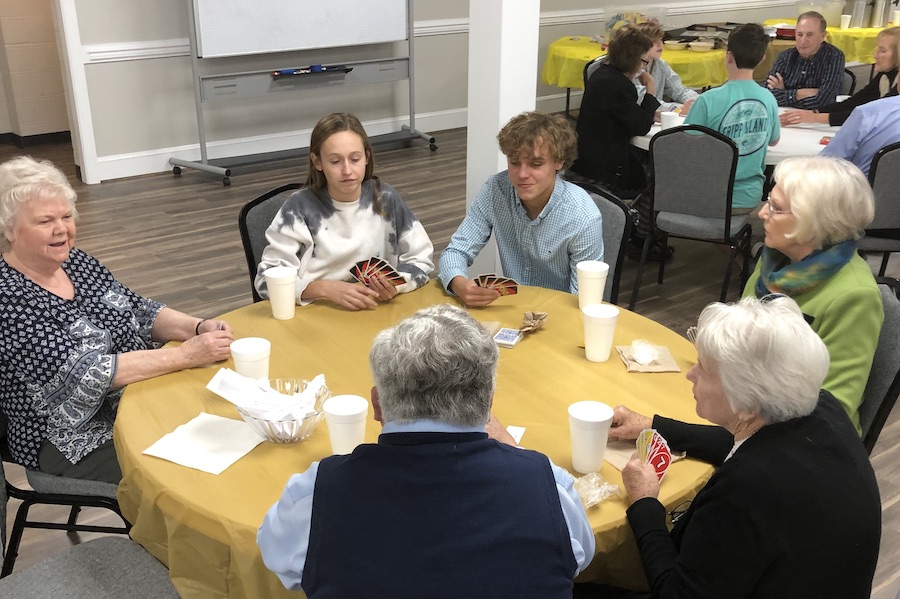A graduate of the Anderson University College of Christian Studies is helping both young and old form meaningful bonds with one another.
Throughout church history, multiple generations have worshiped together. As times changed there were well-intentioned efforts to minister to various age groups separately.
Zach Hart, minister of youth at Roebuck Baptist Church in Spartanburg County, was doing a study on the book of Ephesians in the Bible with his youth group. Using the example of how Paul would preach the Gospel to both Gentile and Jew, Hart wanted his group of teenagers to consider ways they could relate to those who are different, whether by background or age group. Chuck Miller, formerly youth pastor at Roebuck Baptist, had done something similar with youth and seniors, meeting one-on-one in homes, and the idea was revived, this time taking place at the church.
While he was a student at Anderson University, Hart and his wife Marley were involved in multigenerational groups while attending Renewal, a local church. When he was called to Roebuck Baptist Church, Hart remembers a question coming up in a conversation with other church staff about youth becoming less separated and more involved in what the rest of the church is doing.
“We all have our tribes we run in,” says Hart. “Sometimes we let certain people into those tribes for different reasons, but we identify with those tribes and don’t always jump outside these tribes. But really those are earthly ways we identify ourselves and we’ve actually been made new as God’s people.”
Hart and the church’s pastor wanted to see the youth of the church pair up with older members to get to know each other. The COVID-19 Pandemic put initial plans on hold, but in October, nearly 50 individuals, both young and old, got together after a Sunday morning worship service to enjoy food, fellowship and some fun activities.
“We played ‘Jeopardy’ together. We had the oldest person versus the youngest person play rock paper scissors,” Hart said. “I’ve had senior adults come up to me telling me how much they enjoyed it.”
Hart was pleased at the number of youth from grades 6 through 12 signing up for the activity.
“They were coming to me 15 minutes into the meal; they’re grabbing their seconds and they were like ‘this is awesome. We love this’,” Hart said, adding that there are plans to meet regularly.
“The Bible doesn’t stress finding believers your age. You just need to fellowship with other believers,” Hart said.
Hart’s approach to multigenerational ministry reflects the instruction youth ministry students receive in the College of Christian Studies and the Clamp Divinity School at Anderson University.
Dr. Tim McKnight, Director of the Global Center for Youth Ministry at Anderson University states, “We teach our students that youth ministry involves the congregation, parents, youth ministers, adult volunteers and student leaders. Healthy youth ministries have a multigenerational approach that supplements discipleship from parents and legal guardians with spiritual mentorship from other adults in the congregation. Churches should involve their youth in all aspects of church life. As disciples of Christ, teenagers are part of the body of Christ.”

